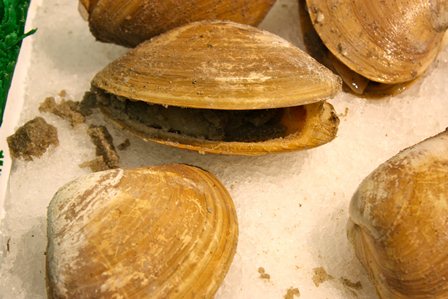 (CNN) -- Korean shellfish shipped to the United States may have been exposed to human feces and potentially contaminated with norovirus, the Food and Drug Administration warned distributors, retailers and other food service operators Thursday.
(CNN) -- Korean shellfish shipped to the United States may have been exposed to human feces and potentially contaminated with norovirus, the Food and Drug Administration warned distributors, retailers and other food service operators Thursday.
After evaluating Korea's shellfish sanitation program, the FDA said it found significant deficiencies, including inadequate sanitary controls, ineffective management of land-based pollution sources and the presence of norovirus in shellfish growing areas.
The agency said all fresh, frozen, canned and processed oysters, clams, mussels and whole and roe-on scallops - known as molluscan shellfish - that entered the country from Korea should not be sold.
On May 1 the FDA removed Korean certified shippers of molluscan shellfish from the Interstate Certified Shellfish Shippers List. The list is published monthly by the FDA to show products that have been certified by the United States, Canada, New Zealand and Mexico. Korea was on this list but the agency said Korea's shellfish sanitation program no longer meets sanitation standards.
According to an FDA news release, "Molluscan shellfish contaminated with fecal waste and/or norovirus are considered adulterated under the Federal Food, Drug, and Cosmetic Act. Following initial notifications last month, a number of food companies have begun to remove these products from their distribution chain. However, many others have yet to take action."
The agency says it has had no reports of sickness due to Korean shellfish, but consumers who have bought shellfish they believe may be from Korea should contact the store and check the origin.
Health officials said if you have shellfish from Korea or products made with Korean shellfish, get rid of them.
FDA spokesman Curtis Allen said there were four reported cases of illness tied to Korean shellfish last year, but there haven't been any cases reported this year. Still, he said consumers should err on the side of caution.
"If you recently bought molluscan shellfish, check with the store to see where it was harvested. If it's bagged or canned, the label should have the country of origin, so check the label before you buy it. But only a small percentage of shellfish that is sold in the U.S. are from Korea." Allen said most shellfish sold in the United States is harvested from U.S. waters.
Norovirus is very contagious. It can be transmitted from contaminated food or water, even by touching contaminated surfaces. It causes gastroenteritis - an inflammation of the stomach or intestines. Symptoms include nausea, diarrhea and stomach pain. According to the Centers for Disease Control and Prevention, the virus causes about 21 million illnesses a year, 70,000 hospitalizations and 800 deaths.
Portland and Seattle
Free Subscription to Breaking News
Free Subscription to Breaking News





















































































































































































































































































































































